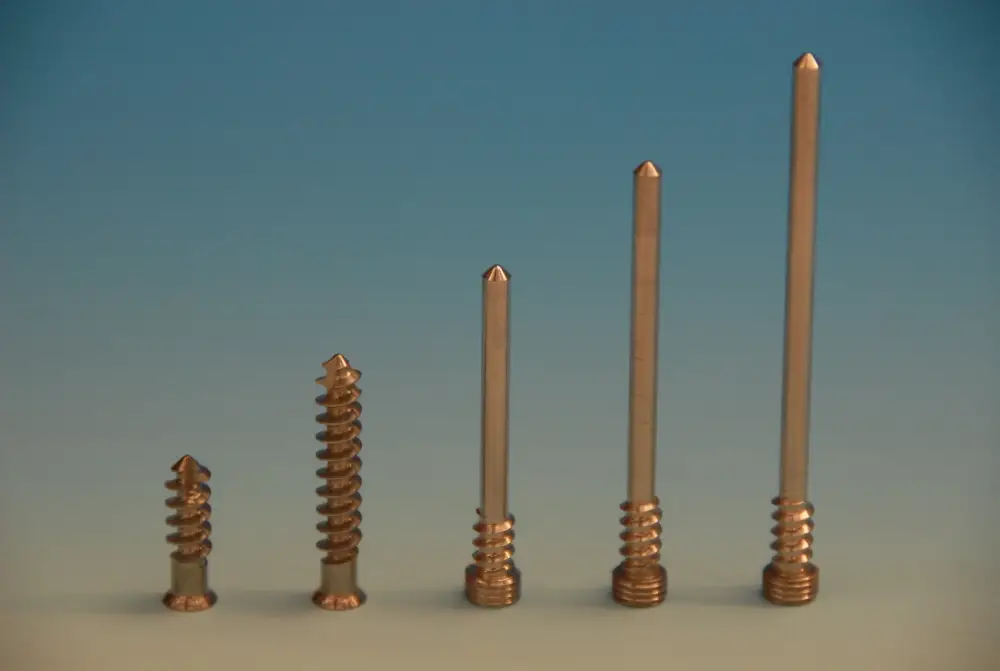Materials Used For Manufacturing Orthopedic Implant Devices

Orthopedic implants replace natural bone and joint structures that are injured or deteriorated due to injury or aging. Because they are placed inside a patient’s body, they must meet high standards for biocompatibility, corrosion resistance, strength, and durability. These help ensure proper functionality and mobility, and also lower the risks of implant rejection or failure.
At Unity Precision Manufacturing, we have over 50 years of experience manufacturing implants, medical devices, and instruments. We understand the significance of creating high-quality, durable orthopedic implants that seamlessly integrate with the body, enabling patients to return to doing what they love and living without pain.
About Orthopedic Implants
Orthopedic implants allow patients to regain their full range of motion and experience a significant reduction in pain after replacement surgery and recovery. These artificial devices replace injured or deteriorated bones and joints when natural repair is insufficient or impossible.
The orthopedic implant process involves removing unhealthy tissue and replacing it with prosthetic implant devices that integrate with the surrounding healthy bone and tissue. While orthopedic implants commonly repair major joints such as hips, knees, shoulders, and ankles, they can also be used with smaller joints like thumbs, fingers, and toes.
What Materials Are Used To Build Artificial Joints?
The materials selected to manufacture different implants are determined by a number of factors including the patient’s age, load-bearing requirements of the joint, part manufacturability, unit cost, and joint useful life, among others. The medical industry has long relied on proven biocompatible materials for artificial joints, including metals, polymers, and ceramics.
The primary metals used in orthopedic implants are:
- Titanium. This material is extremely strong and lightweight, making it a common choice for knee and hip joint implants. It is also corrosion- and temperature-resistant.
- Cobalt-based alloys. Known for their durability, resistance to wear, and non-magnetic properties, cobalt alloys can withstand high temperatures and corrosive environments, making them an excellent choice for long-lasting joint implants.
Polymers and ceramics are also used to build artificial joints:
- Polymers. Several types of polymers are used for orthopedic implants. A traditional choice is high-density polyethylene (HDPE); however, with the growth of additive manufacturing capabilities for creating complex or intricate shapes, additional plastic materials are gaining acceptance including ketone-based materials like polyetheretherketone (PEEK) and polyetherketoneketone (PEKK), and thermoplastic polyurethane (TPU). Self-lubricious materials like silicone and ultra-high molecular weight polyethylene (UHMWPE) are also valued for their non-stick qualities, which can streamline manufacturing processes for shorter lead times.
- Ceramics. Ceramics have excellent hardness and chemical resistance and are often used as alternatives to metal-on-polymer combinations, but they lack the strength and durability of metal and plastics. Ceramics are also commonly used as coatings on metal implant components.
Why Quality Materials For Ortho Implants Is Important
As with all medical devices and instruments, the materials used in orthopedic implants must meet stringent safety, strength, and biocompatibility requirements. Because they are intended for ongoing, regular use inside a patient’s body, they must be able to bear weight, resist impact, and provide an acceptable range of motion, in addition to structural support.
Additionally, orthopedic materials must be strong and resistant to wear and fatigue. Corrosion resistance is important since ortho implants are subject to the corrosive internal environment of the human body. Materials need to be inert and must not degrade or produce harmful by-products.
Surface finishes, smoothness, and heat resistance are also important properties for implant materials so components can be cleaned and sterilized prior to implantation. Traces of lubricants, dust, or other particulate contamination pose health risks and can cause artificial joints to fail or be rejected.
At Unity Precision Manufacturing, we are ISO 13485 and ISO 9001 certified. Quality control and validated processes, including cleaning and passivation, are our top priorities. We ensure each implant meets the highest industry standards for performance and safety.
Quality Orthopedic Implant Contract Manufacturing by Unity Precision Manufacturing
Unity Precision Manufacturing is a leader in the orthopedic implant manufacturing industry. We produce medical devices that meet the exacting standards of medical professionals and medical OEMs, and specialize in spine implants, replacement joints and assemblies, and surgical instruments. Our commitment to quality, precision, and on-time delivery ensures that your orthopedic implants will be reliable, durable, and effective.
Request a quote today to get started.